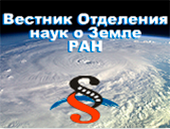History of founding and development of the Institute
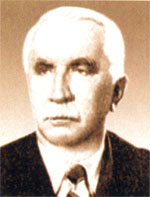
|
|
L.D. Shevjakov |
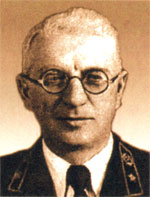
|
|
L.N. Bykov |
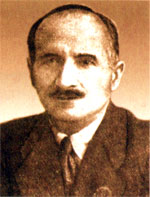
|
|
K.M. Charkviani |
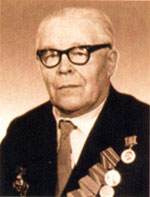
|
|
I.N. Sidorov |
Considering the development of national economy to be very important in Urals, presidium of USSR Academy of Sciences found it necessary to enforce the work of Ural Branch of USSR AS and to create, along with number of other institutions, Mining and Geological Institute (resolution of USSR AS Presidium, 16 June 1939, #19). In the system of Ural branch of USSR Academy of Sciences a new scientific direction appeared, which was connected with geological and mining-and-technical researches. Institute of Mining and Geology incorporated three sectors: geological, geophysical and mining. The post of its director was taken by prominent scientist, mining engineer, member of academy, L.D. Shevjakov, the academic secretary was V.K. Buchnev. The main area of focus of mining sector (headed by professor L.N. Bykov, Doctor of Engineering) was determined as improving systems of working mineral deposits, fighting fires at copper-sulphide mines and rock pressure. By end of 1939 the Institute of Mining and Geology had 26 members, of which: mining sector – 11, geological – 10, geophysical – 3.
The Institute’s activity during Great Patriotic War was deeply intertwined with the activity of USSR Academy of Sciences, because in 1941 many academic institutions were evacuated to Sverdlovsk, including Presidium of USSR Academy of Sciences.
In 1941, on the initiative of head of USSR Academy of Sciences V.L. Komarov, Commitee on mobilization of Ural resources for the needs of defending the country was established. The Institute took an active part in work of the committee. Mining scientists (L.D. Shevjakov, A.A. Skochinskij, L.N. Bykov, K.M. Charkviani, M.I. Agoshkov, I.N. Sidorov and others) launched great work on searching reserves for increasing the output of important mineralsin mines and open pits of Ural, Altai, Gornaja Shorija and Kazakhstan.
The postwar period is characterized by growth of mining sector in amount and widening of range of its investigations. In 1944 L.E. Zubrilov joined mining sector, in 1945 – K.V. Kochnev, in 1947 – B.V. Faddeev, in 1949 – G.G. Fedorova. In1951-1956 A.V. Paducheva, B.M. Shulmin, Y.M. Puchkov, S.S. Filatov, I.S. Kuklin; in 1957-1960 – M.V. Vasiljev, P.S. Danchev, K.M. Shtukaturov, G.N. Khruschev, M.L. Rudakov, V.A. Shhelkanov, Y.I. Belyakov, E.P. Doronenko, V.P. Vetluzhskih, V.M. Alenichev, A.D. Sashourin, A.A. Smirnov, V.G. Zoteev, V.S. Volotkovskyi and others were accepted in mining sector.
During this period, the mining sector consisted of two laboratories: underground mining of coal deposits (headed by I.N. Sidorov) and underground mining of ore deposits (headed by K.M. Charkviani). In the middle of 1950th team of ventilation and team of surface mining and conveyer transport (B.V. Faddeev) were working along. On their ground, in 1957, under the management of M.V. Vasiljev, laboratory of surface mining was established. In 1959 laboratories of rock pressure and rigidity of edge of open-pit mine (M.L. Rudakov), blasting operations (P.S. Danchev), in 1960 – laboratory of mining aerology (K.V.Kochnev) were established.
In 1958, M.V. Vasiljev was appointed deputy chairman of Ural Branch of Presidium of Academy of Sciences, and in1959 he was combining this work with the post of head of mining sector at Institute of Mining and Geology.
In connection with rapid development of surface mining of commercial minerals, the laboratory of surface mining, along with technological problems, launched researches on problems of open-cut transport. at the same time, the nature was explored and methods of fighting gas emissions at underground mining of coal in Kizel basin and potassium salts of Verkhnekamskoye deposit were developed. Investigations of air change in open pit were started, first in the global practice. The discovered patterns allowed to elaborate recommendations on improvement and enhancement of atmosphere in open pits for mining enterprises.
The increase in amount and sophistication of conducted researches led to necessity of restructuring the Institute of Mining and Geology of Ural Branch of USSR Academy of Sciences. According to order of Council of Ministers of RSFSR #579 d/d 24, February, 1962, the Institute of Mining and Geology was divided into the Institute of Mining Engineering and Institute of Geology. M.V. Vasiljev was appointed director of the Institute of Mining Enginering, V.A. Shhelkanov – academic secretary.
Together with structural changes, scientific researches in the field of mining were growing and cadre was expanding. In the period of 1961-1964 V.L. Yakovlev, A.V. Zubkov, V.P. Smirnov, S.L. Fesenko, A.N. Shilin, N.P. Vloh, N.L. Staheev, V.M. Senuk, O.V. Slavikovskij, R.I. Suhov, A.I. Pavlov, Y.I. Zhernakov, A.P. Derjagin, V.K. Vasiljev, M.M. Konorev and others joined the Institute. Staff body, formed in 1950th, represents the scientific skeleton of the Institute, and has laid the foundation for its long-time successful activity.
Main menu
- Новости
- Об институте
- Структура
- Дирекция
- Научные подразделения
- Ученый совет
- Диссертационный совет
- Академия горных наук
- НП "Горнопромышленная ассоциация Урала"
- Совет молодых ученых
- Ведущие сотрудники
- НОЦ «Геотехнологии»
- Аспирантура
- Научная библиотека
- Профсоюзный комитет
- Инновации
- Конференции
- Проекты
- Издания
- Видео
- Вакансии
- About Us
Оценка результативности
- Во исполнение Распоряжения ФАНО России от 25.04.2017 № 111 и согласно письму ФАНО России от 04.05.2017 № 007-18.2-11/МК-138 о внеочередной оценке организациям, Институт горного дела УрО РАН предоставляет в ФАНО России сведения для экспертной оценки результатов деятельности за отчетный период (в приложенном файле в формате .pdf).
Новости науки CNews
- Когда и как водород попал на Землю? Крупнейший на планете резервуар — прямо у нас под носом
- Почему наступают ледниковые периоды? Ученые назначили козлом отпущения Марс
- Новое исследование показывает, что человеческий мозг работает на автопилоте две трети дня
- 14 000 лет назад волчонок съел кусок шерстистого носорога — это помогло раскрыть тайну вымирания гигантов ледникового периода
- Дирижабли поднимут квантовые центры обработки данных в стратосферу — зачем это нужно?


